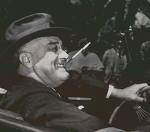
December 7, 1941 is "a date which will live in infamy," according to Franklin Delano Roosevelt. American school children are taught of the sneak attack on Pearl Harbor that day, the likes of which Americans would not see again until the new Pearl Harbor of 9-11.
After the attack, Americans, no longer reluctant to support direct involvement in World War II, willingly surrendered their freedoms to support the war effort. Inhabitants of the land of the free accepted wage and price controls, a draft, rationing, prison camps for 110,000 Americans of Japanese ancestry, and income tax withholding during World War II.
In his speech after the Pearl Harbor attack, referring to Japan, FDR said that "the United States was at peace with that nation." In contrast the book Day of Deceit, by Robert Stinnett, shows a copy of the October 1940 McCollum memo, obtained with a Freedom of Information Act request, which advocates US economic warfare with Japan as a way of inciting Japan to war.
Dean Acheson, Secretary of State during the Truman administration, was Assistant Secretary of State under FDR. Acheson's self-deification in Present at the Creation, his book about his years in the State Department from 1940 to 1953, gives details of FDR's pre-war policy toward Japan, which Acheson characterizes as an economic war against the Japanese:
- "Everyone in Washington wanted in on economic warfare..."[1]
- "Two other potent instruments for helping friends and harming foes... furnishing supplies to our friends with lend-lease and withholding them from our foes by financial freezing orders."[2]
- In August 1940, the US restricted aviation gasoline shipments to the western hemisphere; Japan bore the brunt of this embargo.[3]
- In September 1940, the US limited the export of iron and steel scrap with the exception of to Great Britain. Japan was the principal buyer of American scrap metals.[4]
- On July 26, 1941, the the US froze Japanese assets. Japanese tankers in US ports were unable to buy US oil. The State department was concerned that this measure would drive the Japanese to attack Indonesia for oil.[5]
- Japan considered the US economic measures an "effective weapon" and the cutoff of oil was an act threatening their survival.[6]
Acheson's description of what happened matches the McCollum memo proposal of what should happen to provoke an attack.
Contrary to his 1940 campaign promise to "not send American boys into any foreign wars," FDR and his administration wanted the US in World War II. Acheson disagreed with first US President Washington's farewell address, which bid his countrymen to avoid entangling alliances, calling it "isolationism."[7] Whether or not you believe FDR tried to incite the Japanese to attack the US, whether or not you believe he knew in advance of the attack on Pearl Harbor, FDR did use the attack to get Congress to declare war and most Americans supported the war effort and the resultant sacrifice of lives, wealth, and freedom.
In a time of crisis, people give up their freedoms willingly. The Project for a New American Century (PNAC) predicted a similar effect on page 51 of in its 2000 report, "Rebuilding America's Defenses" (available here in pdf) if a "new Pearl Harbor" occurred. The PNAC group was correct. Many Americans supported the invasions of both Afghanistan and Iraq, the Patriot Act, and the creation of another government bureaucracy: Homeland Security, in the name of (literally) security.
We're in an economic crisis, exacerbated by the wars in Iraq and Afghanistan and by the growth of government spawned by post-911 security measures. There are those who think we'll willingly give up even more of our freedoms for the perception of security, much as Americans did under FDR during the Great Depression and later after Pearl Harbor was bombed.
Are they right?
____________________________
[1]Present at the Creation, Dean Acheson, W.W. Norton & Co., N.Y., N.Y., 1969, p.46.
[2] ibid. pp 46-7.
[3] ibid. p.42
[4] ibid. p.43
[5] ibid. p.49
[6] ibid. p. 65.
[7] ibid. pp. 27-8.




No comments:
Post a Comment